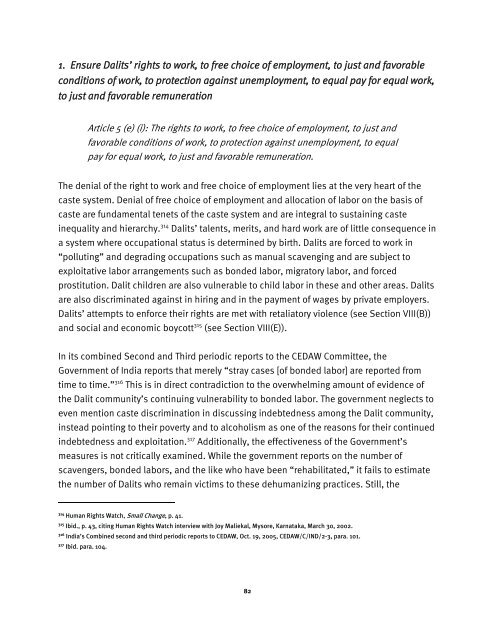Caste Discrimination against India's âUntouchablesâ - Human Rights ...
Caste Discrimination against India's âUntouchablesâ - Human Rights ...
Caste Discrimination against India's âUntouchablesâ - Human Rights ...
You also want an ePaper? Increase the reach of your titles
YUMPU automatically turns print PDFs into web optimized ePapers that Google loves.
1. Ensure Dalits’ rights to work, to free choice of employment, to just and favorable<br />
conditions of work, to protection <strong>against</strong> unemployment, to equal pay for equal work,<br />
to just and favorable remuneration<br />
Article 5 (e) (i): The rights to work, to free choice of employment, to just and<br />
favorable conditions of work, to protection <strong>against</strong> unemployment, to equal<br />
pay for equal work, to just and favorable remuneration.<br />
The denial of the right to work and free choice of employment lies at the very heart of the<br />
caste system. Denial of free choice of employment and allocation of labor on the basis of<br />
caste are fundamental tenets of the caste system and are integral to sustaining caste<br />
inequality and hierarchy. 314 Dalits’ talents, merits, and hard work are of little consequence in<br />
a system where occupational status is determined by birth. Dalits are forced to work in<br />
“polluting” and degrading occupations such as manual scavenging and are subject to<br />
exploitative labor arrangements such as bonded labor, migratory labor, and forced<br />
prostitution. Dalit children are also vulnerable to child labor in these and other areas. Dalits<br />
are also discriminated <strong>against</strong> in hiring and in the payment of wages by private employers.<br />
Dalits’ attempts to enforce their rights are met with retaliatory violence (see Section VIII(B))<br />
and social and economic boycott 315 (see Section VIII(E)).<br />
In its combined Second and Third periodic reports to the CEDAW Committee, the<br />
Government of India reports that merely “stray cases [of bonded labor] are reported from<br />
time to time.” 316 This is in direct contradiction to the overwhelming amount of evidence of<br />
the Dalit community’s continuing vulnerability to bonded labor. The government neglects to<br />
even mention caste discrimination in discussing indebtedness among the Dalit community,<br />
instead pointing to their poverty and to alcoholism as one of the reasons for their continued<br />
indebtedness and exploitation. 317 Additionally, the effectiveness of the Government’s<br />
measures is not critically examined. While the government reports on the number of<br />
scavengers, bonded labors, and the like who have been “rehabilitated,” it fails to estimate<br />
the number of Dalits who remain victims to these dehumanizing practices. Still, the<br />
314<br />
<strong>Human</strong> <strong>Rights</strong> Watch, Small Change, p. 41.<br />
315<br />
Ibid., p. 43, citing <strong>Human</strong> <strong>Rights</strong> Watch interview with Joy Maliekal, Mysore, Karnataka, March 30, 2002.<br />
316<br />
India’s Combined second and third periodic reports to CEDAW, Oct. 19, 2005, CEDAW/C/IND/2-3, para. 101.<br />
317<br />
Ibid. para. 104.<br />
82

















